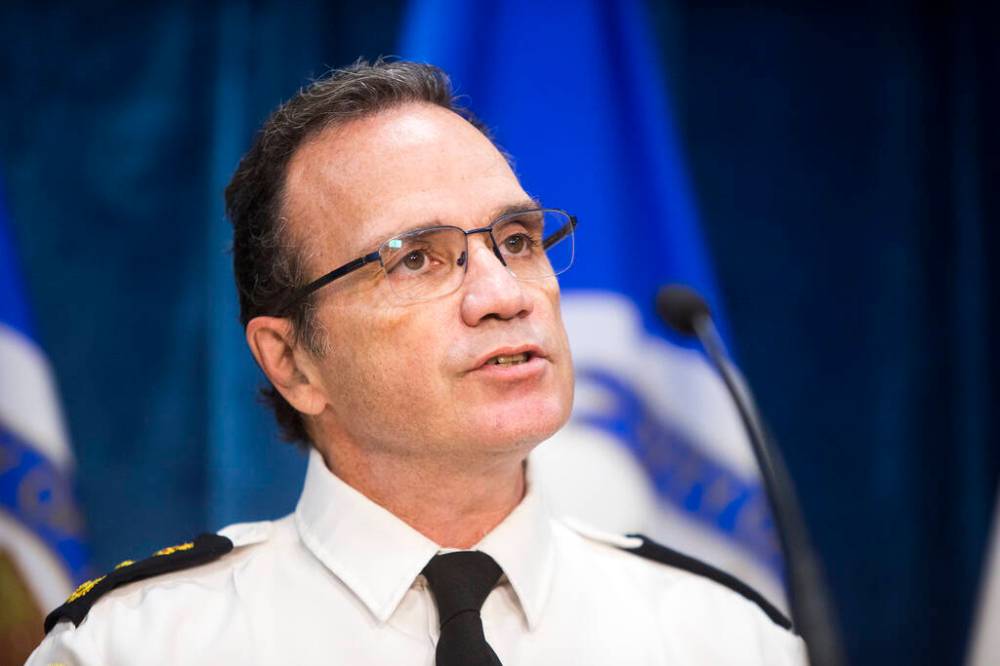Winnipeg police duties don’t include reshaping the narrative
Read this article for free:
or
Already have an account? Log in here »
To continue reading, please subscribe:
Monthly Digital Subscription
$0 for the first 4 weeks*
- Enjoy unlimited reading on winnipegfreepress.com
- Read the E-Edition, our digital replica newspaper
- Access News Break, our award-winning app
- Play interactive puzzles
*No charge for 4 weeks then price increases to the regular rate of $19.00 plus GST every four weeks. Offer available to new and qualified returning subscribers only. Cancel any time.
Monthly Digital Subscription
$4.75/week*
- Enjoy unlimited reading on winnipegfreepress.com
- Read the E-Edition, our digital replica newspaper
- Access News Break, our award-winning app
- Play interactive puzzles
*Billed as $19 plus GST every four weeks. Cancel any time.
To continue reading, please subscribe:
Add Free Press access to your Brandon Sun subscription for only an additional
$1 for the first 4 weeks*
*Your next subscription payment will increase by $1.00 and you will be charged $16.99 plus GST for four weeks. After four weeks, your payment will increase to $23.99 plus GST every four weeks.
Read unlimited articles for free today:
or
Already have an account? Log in here »
Hey there, time traveller!
This article was published 10/03/2022 (1370 days ago), so information in it may no longer be current.
We have, it seems, a problem with oversight.
Many observers, including a city councillor who this week resigned in dismay from the Winnipeg Police Board, think the Winnipeg Police Service requires more of it. The people who lead the service, including its top commander, Chief Danny Smyth, seem more inclined to believe it is already subjected to too much.
Coun. Brian Mayes (St. Vital) on Monday stepped away from the police board because “the board’s relationship with city council has become dysfunctional, with ongoing arguments over respective roles and jurisdictions.”
He urged the province — which is currently preparing legislation to reform the Police Services Act — to “consider other alternatives for civilian oversight of policing,” and in a subsequent interview said, “I don’t know if (the board is) a productive use of anyone’s time.”
Meanwhile, at a time when the WPS is under intense scrutiny for its handling of — or, some critics argue, its failure to handle — the anti-mandate protest/occupation that disrupted Winnipeg’s downtown for several weeks, Mr. Smyth and other top officials have opted to join a subscription-based U.S. online publishing platform in an effort to disseminate their perspectives on policing in an unfiltered and unchallenged manner.

In a post on the WPS’s Substack page, which is titled “Tried and True,” Mr. Smyth opens by asking, “How do we tell our story? What is the best way to communicate with our employees … or with the public?” He acknowledges the service employs social-media platforms (Twitter, Facebook, Instagram, TikTok) to get its message out, but laments the manner in which the WPS is portrayed in more conventional media.
“There was a time when traditional/legacy media could be relied upon to tell a balanced story,” Mr. Smyth writes. “Sure, they could ask tough questions, but at the end of the day, they usually portrayed stories involving the police fairly. I am not so sure about that anymore.” He complains of an “ideological shift” and a “harshness about reporting on police that too often serves to undermine trust and confidence in policing.”
Substack, he concludes, is “worth a try” as a means to “tell our story.”
“There was a time when traditional/legacy media could be relied upon to tell a balanced story… Sure, they could ask tough questions, but at the end of the day, they usually portrayed stories involving the police fairly. I am not so sure about that anymore.” – Chief Danny Smyth
Except, it really isn’t “worth a try,” because the concern of the WPS should not be shaping public opinion in its favour by skirting traditional mechanisms of accountability and instead offering a concocted rendering of its “story” in a forum that is more familiarly used by creative writers and journalists seeking to be freed of editorial oversight.
The WPS’s concern should be protecting the public and, as it is afforded the discretion of employing force — up to and including the deadly variety when circumstances dictate — to do so, it should be fully willing to answer publicly for the actions it takes in upholding the law.
Mr. Smyth can be excused for feeling the glare of the public-accountability spotlight has grown exponentially more intense. Particularly after the murder of George Floyd by Minneapolis police in 2020, law-enforcement practices everywhere have been analyzed and criticized, and large-scale protests have called for the “defunding” of police services as they are currently configured.
Particularly after the murder of George Floyd by Minneapolis police in 2020, law-enforcement practices everywhere have been analyzed and criticized, and large-scale protests have called for the “defunding” of police services as they are currently configured.
But the response to such scrutiny should be dialogue, reflection and reform, not a defensive retreat to a bunker from which glorified blog posts are dispatched in the hope of “telling our story.” Police behaviour itself, not media reporting about it, will dictate public opinion.
By dint of its role as a protector of citizens, the WPS must be fully accountable. The promised legislative reforms must create the mechanisms that assure it is, and its top officer should focus on reforming WPS practices accordingly rather than defiantly seeking to reshape the narrative.










